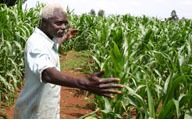
Smallholder Farmers Connect to National and International Markets
ACDI/VOCA implemented a two-year USAID-funded Market Linkages Initiative (MLI) as a subgrantee to CARANA Corporation. The goal of MLI was to increase commercial integration of smallholder staple food producers into national and regional markets to promote growth in food staples and food security.
The project is composed of two components: one based in Malawi with a focus on Malawi trade corridors (M-MLI), and one based in Kenya with a focus on East Africa’s Northern Corridor Activity (NCA-MLI).
Malawi-MLI (M-MLI)
The Lilongwe-based M-MLI team, led by ACDI/VOCA’s Deputy Chief of Party, strengthened two weak links in the staple crop value chain: strategically located grain bulking centers (GBCs) and the integration of a financially sustainable real-time market information system (MIS).
Modern storage for staple crops is rare in Malawi and almost nonexistent in rural areas. Where they do exist in rural areas, many farmers do not have the means to transport their crops themselves, and they lack trust in the warehouse managers to protect their deposits. Most farmers sell to traders who transport their crops long distances to reach storage facilities. Later in the season, when farmers need to buy back commodity for their own consumption, traders move it back to its origin – doubling the transport costs and increasing the price.
Over the course of the project, the M-MLI team developed, strengthened, and facilitated the certification of at least 20 privately managed GBCs in the northern, central, and southern regions of Malawi. M-MLI worked with producers and warehouse managers to build business relationships based on transparency and trust. The project also facilitated trainings for producer associations in order to explain how and why to use GBCs, how to decide whether to sell or store commodities, and contracting mechanisms for smallholder groups and associations.
Access to GBCs give farmers and traders more freedom to decide when to sell. In order to make the best decisions they must have access to real-time market information. M-MLI developed a simple and sustainable MIS for targeted beneficiaries. With access to accurate market information via information communications technology, farmers and traders are able to maximize the market timing benefit that storage enables.
Impacts of the Malawi-MLI project included:
- Higher household food security and income, reducing poverty and increasing resilience
- Increased ability of farmers to optimize sales of surplus production and get higher prices through MIS technology
- Stable prices and more reliable supplies of staple crops
- Reduced post-harvest losses through GBC development
East Africa’s Northern Corridor Activity – MLI (NCA-MLI)
Most rural populations in East and Central Africa rely on agriculture for their livelihood and get the majority of their food from a few common staple crops. Significant quantities of agricultural commodities are transported in the Northern Corridor, yet the region has much higher potential for staple crops than is currently produced. ACDI/VOCA contributes technical expertise to the Nairobi-based NCA-MLI team.
The NCA-MLI initiative, led by CARANA Corporation’s Chief of Party (COP), achieved the following results in East Africa:
- Improved rural post-harvest handling and storage capacity along key market sheds
- Expanded capacity for pre-storage crop conditioning to ensure higher quality crops and reduce post-harvest losses from mold and insect infestation
- Linked storage facilities to surplus staple food commodities and to viable local and regional end markets
- Collaborated with other regional programs to maximize the number of beneficiaries and share lessons learned between programs
NCA-MLI concentrated on three main trade corridors: Northern Uganda and Southern Sudan, Great Lakes Region, and East Africa (Kenya and Uganda).





